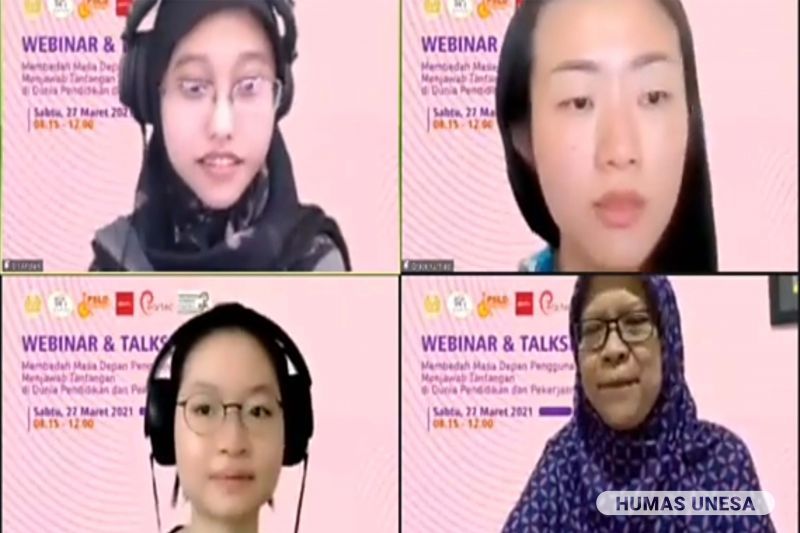
www.unesa.ac.id
Unesa.ac.id, Surabaya-The Center for The Study and Disability Services (PSLD) held a Webinar with the theme "Dissecting the Future of Hearing Aid Users and Cochlear Implants" on Saturday (3/27/2021). The event was held to commemorate World Hearing Day 2021 which falls on March 3, 2021.
Dr. Nyilo Purnami, dr., Sp. T.H.T.K.L.(K), FICS, FICSM, as a speaker on the occasion delivered material about the use of Hearing Aids (ABD) with the latest technology that is growing and has many advantages, among which the sound is clearer and clearer, the size is smaller and almost invisible, can be connected to a mobile phone and there is a processor to process the conversation.
"In Indonesia itself, ABD is widely sold freely in the market without any good inspection, thus causing the use that is not appropriate to the needs. For maximum results, it is best to buy ABD after conducting an examination at an ENT specialist," explained the lecturer of Health Sciences ENT-KL, Faculty of Medicine, Airlangga University.
In addition to using ABD, ENT specialists and ENT consultants at Dr. Soetomo Hospital, revealed that people with severe hearing loss or deafness can have cochlear implants or commonly called Cochlear Implant (CI) by installing special electronic devices on the ears. "Unlike ABD, cochlear implant installation services in Indonesia are still few, only in certain hospitals. In Surabaya itself can be done in Dr. Soetomo Hospital, Dr. Raeslan Hospital and PHC Hospital," he said.
Meanwhile, Prof. Dr. Budiyanto, M.Pd., said the implications of using ABD or CI for people with hearing loss can be classified into three, namely personally, education and work. In the field of education, the Head of the Center for Studies and Disability Services Unesa said that people with hearing loss have the same rights and special attention in studying. "Previously it was necessary to recognize aspects of the level of barriers and intellectual potential of children in order to facilitate the placement of education between public schools or special schools. Plus it is necessary to pay attention to the support system, because institutions that have to adjust the needs of children," he explained.
In addition to holding webinars, the Center for Study and Disability Services of Surabaya State University also collaborated with the Aurica Foundation to hold a talkshow on Saturday (27/3). The virtual event presents young professionals who use ABD or CI to share inspiring stories in answering challenges in the world of education and work.
Grace Kurnaidi, M. Psi., who currently works on a consulting platform recounts her experiences during her education ranging from kindergarten to master's. He said that using ABD as a child and attending public schools is not easy, but there are many challenges. "When the lecturer delivers the material quickly and is in the back I usually experience difficulty hearing. Usually I ask back to the lecturer or ask a friend about the material that is not clear," said Grace.
Evelyn Suhandi, S.D. during her education at Ciputra University, also felt the same way. This Visual Communication Design graduate who is often called Evelyn tells that she was born normal. However, when he was in elementary school he began to experience a decrease in hearing and in junior high school he decided to use hearing aids. While using ABD, it did not work properly eventually he installed a cochlear implant. Nevertheless, he was brave from the beginning and confident to admit that he was hearing impaired, so that his friends could adjust when communicating with him.
Sri Andiani, S. Psi., also recounted that she had been using cochlear implants (CI) since the age of 3. With the help of implants he was able to carve out many achievements in school and now works as an assistant assessor for the selection of new employees and employee promotions. "Although many challenges, but I have a strong desire to continue master's studies such as Ms. Grace," explained the woman who is familiarly called Dian.
Another inspiring story came from Dr. Susanti Tjahja Dini, M. Pd., a mother who has a child with hearing loss. He admitted difficulty in the beginning knowing his son's condition. But he was able to get through with the support of his family, closest people and all parties.
Members of the Association of Disabled People (ASTIFA) also said that insights into hearing loss are important to disseminate to the public. The goal is for people with hearing loss to get the same opportunity while also fostering more confidence. As he had done by giving understanding to teachers and friends about Umar's condition. "For parents, trust in our child's abilities. Whatever their condition is a deposit that must have their own advantages," he concluded. (Meds/zam)
Share It On:






